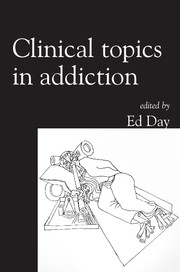Book contents
- Frontmatter
- Contents
- List of tables
- List of boxes
- List of figures
- List of contributors
- Foreword by Nat Wright
- Preface
- 1 What works in drug addiction?
- 2 The development of the drug treatment system in England
- 3 Stimulant use still going strong
- 4 Adverse effects of khat: a review
- 5 What the clinician needs to know about magic mushrooms
- 6 What works in alcohol use disorders?
- 7 Management of alcohol detoxification
- 8 Nicotine addiction and smoking cessation treatments
- 9 Pathological gambling: an overview of assessment and treatment
- 10 Use of investigations in the diagnosis and management of alcohol use disorders
- 11 Laboratory investigations for assessment and management of drug problems
- 12 Pharmacotherapy in dual diagnosis
- 13 Dual diagnosis: management within a psychosocial context
- 14 Treating depression complicated by substance misuse
- 15 Treating anxiety complicated by substance misuse
- 16 An overview of psychological interventions for addictive behaviours
- 17 Motivational interviewing
- 18 Substance misuse in adolescents
- 19 Management of drug misuse in pregnancy
- 20 Intoxication and legal defences
- 21 Substance misuse and violence: the scope and limitations of forensic psychiatry's role
- 22 Literary and biographical perspectives on substance use
- Index
20 - Intoxication and legal defences
Published online by Cambridge University Press: 02 January 2018
- Frontmatter
- Contents
- List of tables
- List of boxes
- List of figures
- List of contributors
- Foreword by Nat Wright
- Preface
- 1 What works in drug addiction?
- 2 The development of the drug treatment system in England
- 3 Stimulant use still going strong
- 4 Adverse effects of khat: a review
- 5 What the clinician needs to know about magic mushrooms
- 6 What works in alcohol use disorders?
- 7 Management of alcohol detoxification
- 8 Nicotine addiction and smoking cessation treatments
- 9 Pathological gambling: an overview of assessment and treatment
- 10 Use of investigations in the diagnosis and management of alcohol use disorders
- 11 Laboratory investigations for assessment and management of drug problems
- 12 Pharmacotherapy in dual diagnosis
- 13 Dual diagnosis: management within a psychosocial context
- 14 Treating depression complicated by substance misuse
- 15 Treating anxiety complicated by substance misuse
- 16 An overview of psychological interventions for addictive behaviours
- 17 Motivational interviewing
- 18 Substance misuse in adolescents
- 19 Management of drug misuse in pregnancy
- 20 Intoxication and legal defences
- 21 Substance misuse and violence: the scope and limitations of forensic psychiatry's role
- 22 Literary and biographical perspectives on substance use
- Index
Summary
Summary Intoxication with alcohol and drugs is commonly associated with criminal offending. The relationship between intoxication and criminal culpability is complex and may be of psychiatric relevance, especially if a legal defence resting on mental condition is being considered. This chapter outlines the legal issues (such as they apply in England and Wales) of which psychiatrists should be aware when preparing medico-legal opinions about mentally disordered offenders.
Intoxication with alcohol or drugs is the obvious theme of certain charges such as drunk and disorderly conduct or drink-driving. In other offences, intoxication may be a factor that can affect or complicate the issue of criminal responsibility.
Approximately 50% of violent offences and property offences are committed after drugs or alcohol have been consumed, and although consumption may not be directly linked to the offence, there is often a strong association between the two.
Psychiatrists are frequently asked to comment on the effects of intoxication on mental responsibility. Although the legal defences of insanity and diminished responsibility are familiar to psychiatrists, the relationship between intoxication and criminal intent is a complex issue that can raise the possibility of defences against particular offences. This chapter will mainly consider the law in England and Wales. The major differences in the legislation of the other jurisdictions in the UK are given in Box 20.1.
The issues surrounding intoxication and legal defence appear to be addressed in a variety of ways, which might reflect the complexity of the legal arguments. The law has arisen as a ‘compromise’ between acknowledging the effects of alcohol and drugs on mental condition and maintaining criminal liability, for the benefit of society. These are areas into which psychiatrists often stray and may even introduce their own moral code. The legal issues that they should be aware of when considering such a venture are outlined below.
There is a generally held belief that many of the legal issues in this area are centred around a theme of intoxication. This is ill-founded and opinions may be sought about the effects of alcohol and drugs without reliable indices of actual intake. The law is less concerned with more modest and minor consumption, although clinicians are often aware of individual variability and the hazards of estimating consumed quantity from the appearance and behaviour of the defendant at the time of the offence.
- Type
- Chapter
- Information
- Clinical Topics in Addiction , pp. 275 - 287Publisher: Royal College of PsychiatristsPrint publication year: 2007



